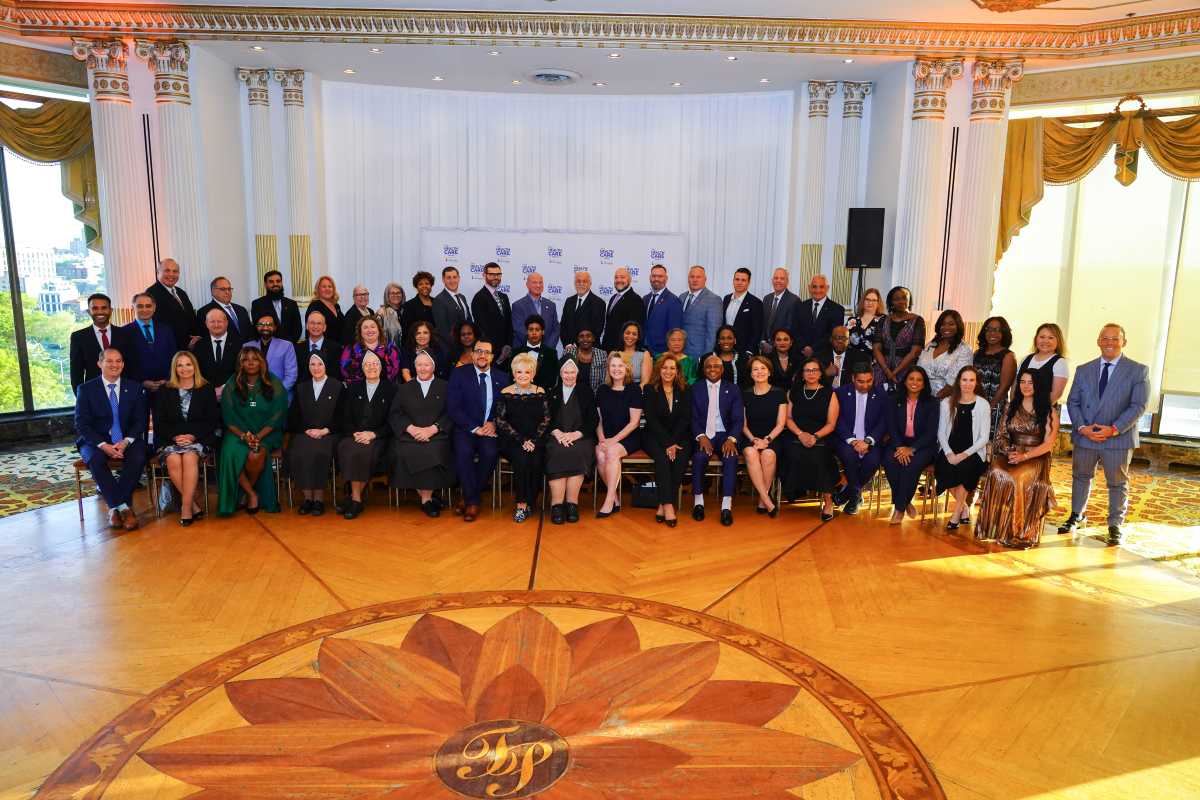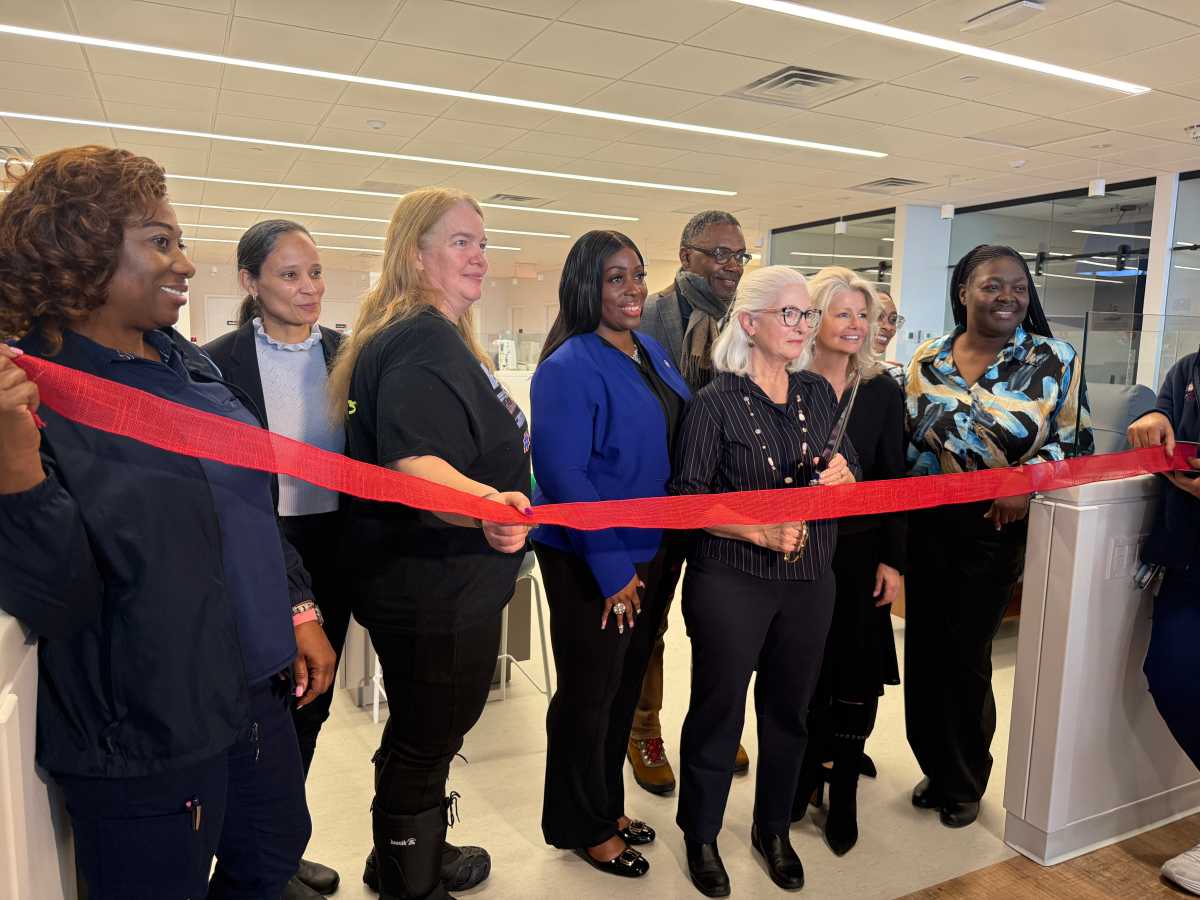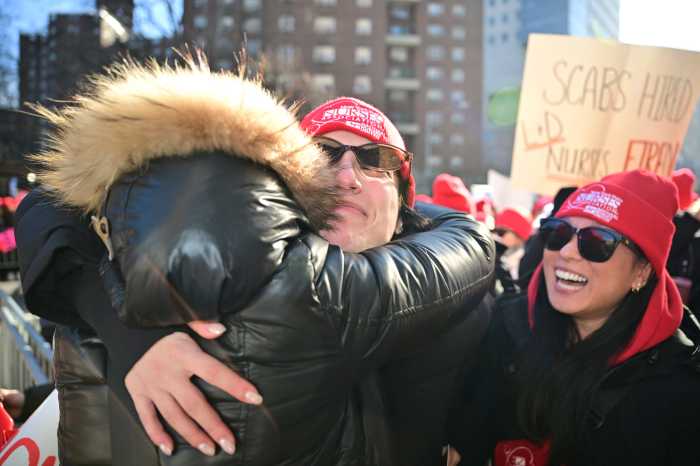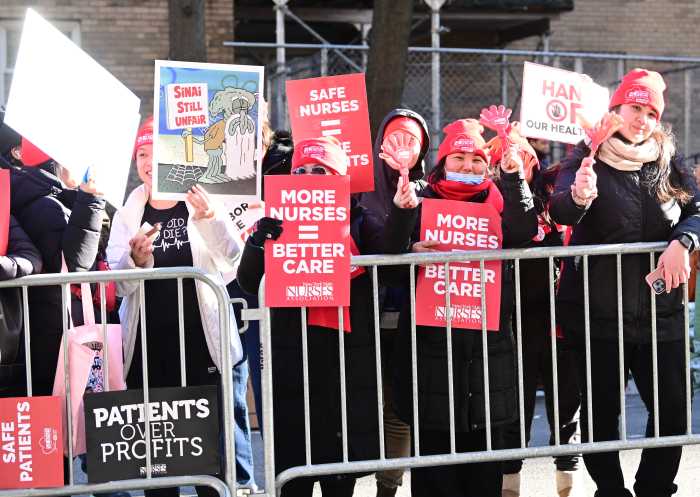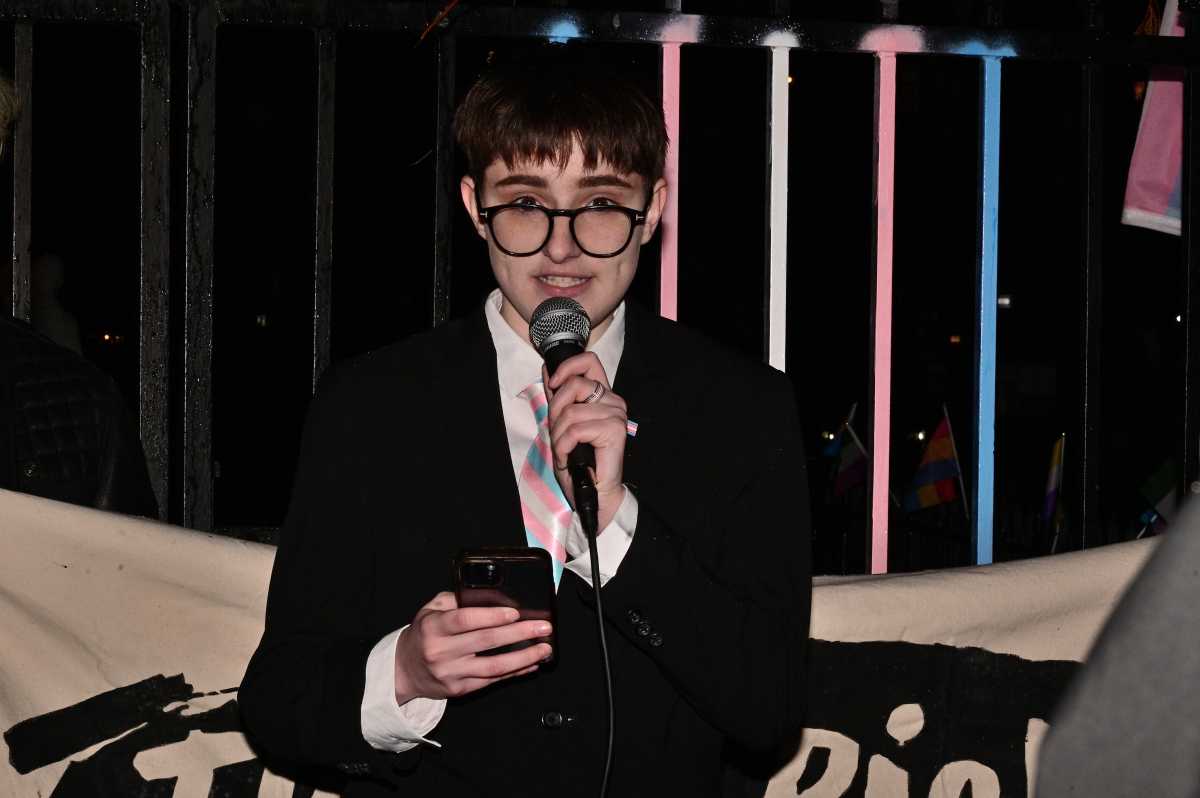Ask most people and they will tell you nothing, or not much, is more crucial than their health. With that in mind, it’s hard to come up with a profession more important, even essential, than healthcare. That makes honoring those in the healthcare industry a particularly noteworthy celebration.
While the Oscars may honor the movies and the Tonys may honor theater, Schneps Media on April 30 celebrated healthcare industry leaders at its “Healthcare Heroes” awards presented by the Carmelite System.
Over 400 people celebrated a wide range of leaders from those offering home care to hospitals, dialysis to mental health, addiction counseling to ambulatory care.
“What’s more important than your health?” asked Schneps Media CEO Joshua Schneps. “This event brings together leaders in healthcare who deserve great recognition for all that they do.”
He noted the importance of bringing together such a diverse group of providers who can both inspire and, potentially, collaborate.
“We love bringing people together to celebrate them and network,” he added. “Most leaders in healthcare don’t have the opportunity to take time to be recognized or be with other people to recognize their achievements.”
Schneps Media President Vicki Schneps said they facilitate connections between honorees, creating community and connection through events.
“We’re here to listen, learn and mingle,” she said. “We consider ourselves the ‘Ultimate Networking Advisors.’”
Leading the way
The event brought together people passionate about their profession, including some who arrived in healthcare from other professions. Trish Gathers, a CPA, rose to be CEO and president of the Carmelite Systems.
“My accounting education has helped me in becoming a CEO. Understanding the financial metrics, working with the leadership and leadership things I have to do,” Gathers said. “We really focus on helping people with their healthcare issues. But it’s a fundamental part of dignity.”
She said honoring people who help others is an important way of showing the importance of the healthcare professions.
“I think it’s the personal experience of honoring people who give of themselves every day,” Gathers added. “I think that’s the heroic part of what we’re doing. Using our compassion to serve others.”
Dr. Marilyn Fraser, CEO of the Arthur Ashe Institute for Urban Health, said listening is a key tool in leadership.
“My secret to success has been listening to everyone,” she said. “Trying to incorporate things I learn from others. I can teach, but also learn from others, too.”
And Dr. Ross MacDonald, chief medical officer of NYC Health + Hospitals/Woodhull and a clinical associate professor of medicine at NYU Grossman School of Medicine, said so much depends on the team.
“I think the biggest challenge and opportunity for success is getting the right team,” he said. “How do you make the circumstances for great people to come and do the work and feel supported?”
Chris Croken, assistant vice president at FourLeaf, said it’s important “to be creative, out of the box, and spunky.”
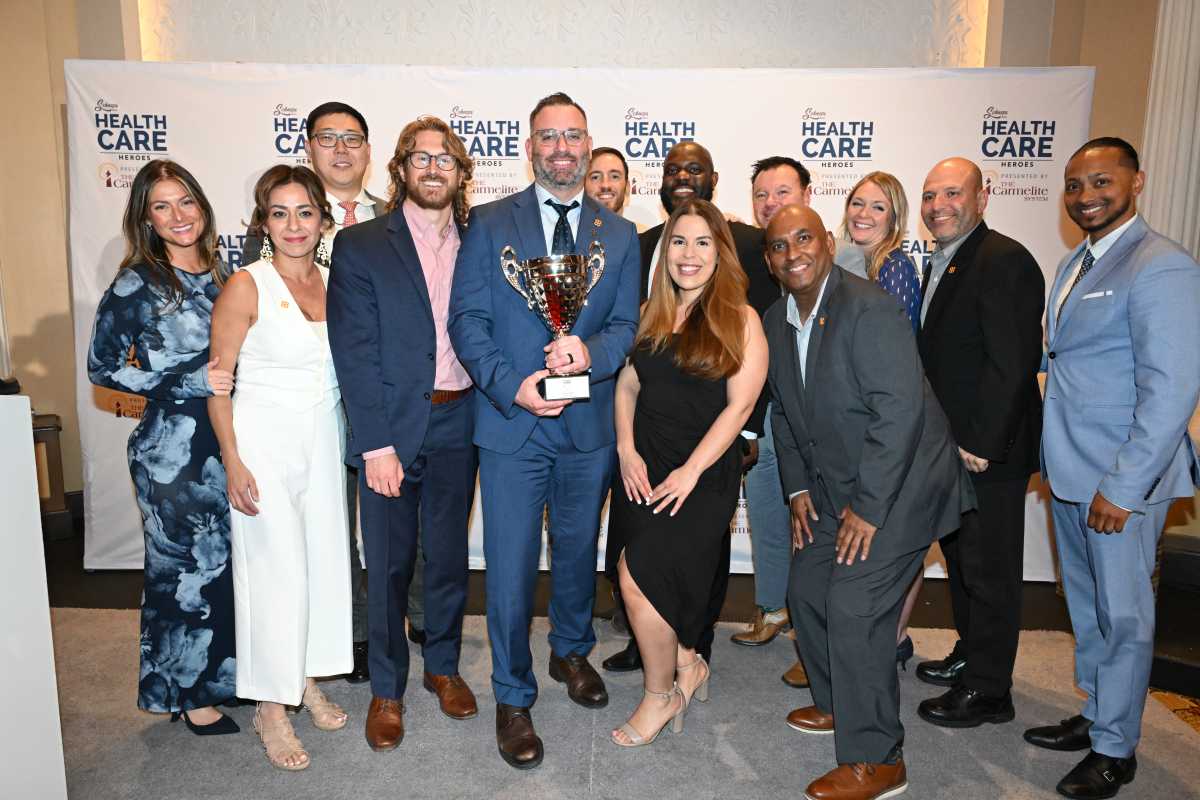
Social work
While many leaders come from medicine, Cristina Contreras, a social worker by training, has risen to be CEO of NYC Health + Hospitals/Lincoln, responsible for day-to-day operations.
“I think the fact that I’m a social worker makes me a better CEO,” she said. “I can relate to people better, connect to people one to one, improving the staff morale and engaging them makes the team stronger.”
She said she engages and motivates staff, noting that uniting so many healthcare providers at an awards ceremony also can open the door to new opportunities.
“This is helpful. You see people in the industry. You can see who’s being highlighted, what they do, and network with them to see if you can collaborate in the future,” she said. “I had some conversations with people from the education section, the healthcare industry. I find it very helpful.”
Dr. Teresa Y. Smith, associate dean of graduate medical education and interim chair of the department of emergency medicine, at SUNY Downstate Health Sciences University, said women sometimes must overcome additional obstacles.
“If they don’t have room for you at the table, bring a chair. If they’re not inviting you to the table, bring your own table,” she said. “Our voices aren’t often heard. The various roles I’ve had in medicine, I made sure that my voice was heard. It’s not just carrying my voice, but the voices of all those not recognized.”
Stress and serenity
Different people gave different advice regarding managing stress, a crucial element for longevity in healthcare. Mother Mary Rose Heery, board chair for the Carmelite Systems, said it’s important to be authentic.
“Be true to yourself and what your calling is,” she said. “And be committed to that each and every day. And find your joy in that.”
Dr. Alexander Hellinger, senior vice president and regional executive director for Northwell Health’s Brooklyn Region, said he works primarily in Brooklyn, but also beyond, “helping wherever they need.”
He said he helped get his daughter interested in karate, to liberate her from the tyranny of screens.
“My happy place is with my daughter and my wife. It could be anywhere, literally, the beach at sunset,” he said. “I love to watch my daughter at karate. Family is my happy place.”
And Ana Tagle, assistant administrator at the Ozanam Hall of Queens, in the Carmelite Systems, said each person needs to find what works for them.
“Focus on what gives you a sense of peace and rejuvenation. It’s different for different people,” she said. “I think it’s really personal, to bring you to that calmness. Working in healthcare has stressors. And managing does as well.”
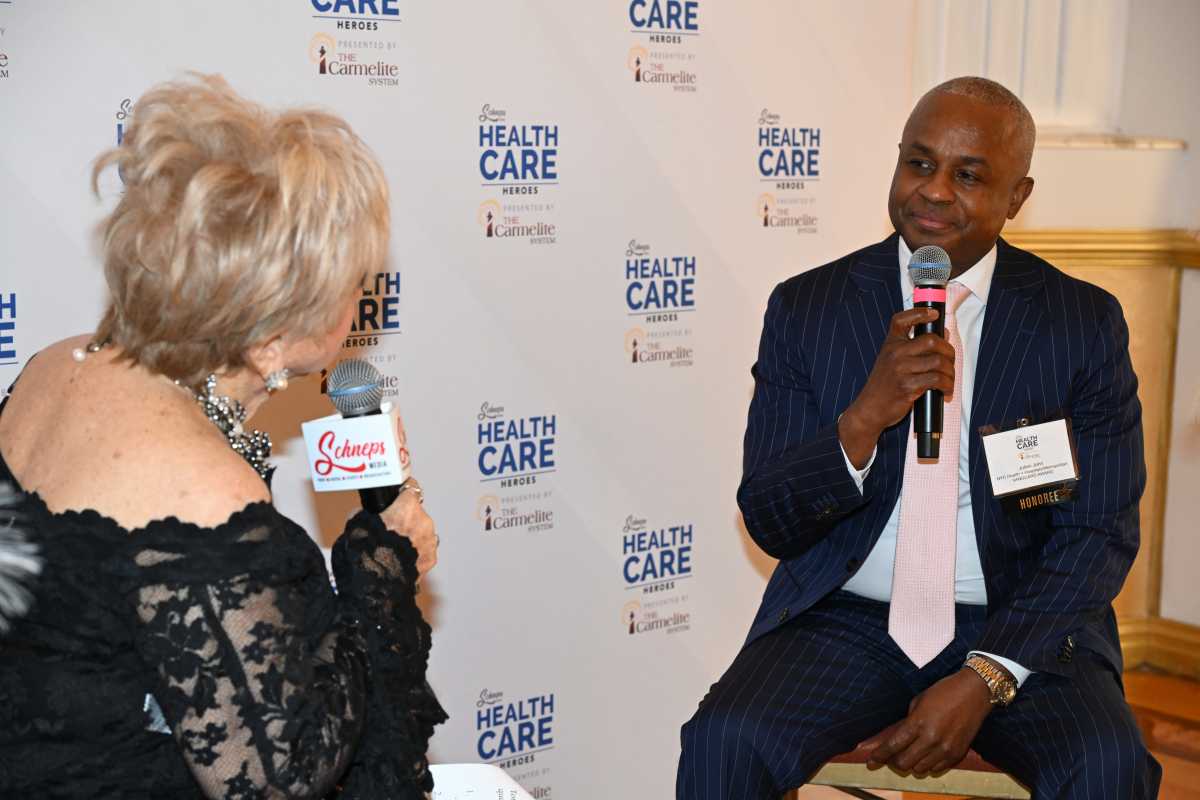
Secrets of their success
Healthcare providers talked about what it takes to succeed over the long haul in a demanding profession. Dr. Carlene Mondesir Harewood, director of OB/GYN at the Joseph P. Addabbo Family Health Center, talked about “preparation, purpose and persistence.”
“It’s challenging,” Dr. Mondesir Harewood added. “We need more hands on deck, more doctors, more nurses. We need more specialists providing care to the underserved population.”
She added that uniting providers from so many specialties gives a bigger, better view of the overall profession.
“I think it’s great to meet people that are giving back to their communities,” she said. “It’s a great opportunity to network, meet other like-minded people.”
Michael N. Rosenblut, president and CEO of the Parker Jewish Institute for Healthcare and Rehabilitation, has helped grow his organization, now also offering sub-acute care, home care and running a surgical center.
He said in addition to working with his team, he has learned to listen to his wife’s advice, as she provides perspective.
And Therese R. Rodriguez, CEO of the Apicha Community Health Center, called herself a “happy warrior” balancing realism and altruism. “We must understand how to use power as well as to be compassionate.”
Deborah Donnelly, a registered nurse at Episcopal Health Services, said humor is key because of the seriousness of the job. “It’s important in healthcare not only to be authentic,” she said, “but to have a very good sense of humor.”
Solving the Shortage
While many people provide care, others train providers, increasing care. Dr. Sergelyne Cadet-Valeus , who trains residents at the Joseph P. Addabbo Family Health Center, said preparing the next generation of providers is paramount.
“It’s a lot of work,” she said. “You teach them everything you know. I love teaching.”
She said she and interns discuss patients as they present how they would manage the patient and she corrects, as needed.
“There’s a shortage of primary care doctors,” Dr. Cadet-Valeus said. “More doctors are doing fellowships, specializing.”
She said free tuition at medical schools is letting many doctors graduate without or with less debt, which can make it easier to go into primary care. She also explained how prayer helps her find peace in a stressful profession.
“You need that outlet,” she said. “When things get really tough, I go to God and let him guide me.”
Systemic strength
While many providers work at smaller organizations, Julian John, CEO of NYC Health and Hospitals/Metropolitan, said being part of the largest public health system in the nation has benefits.
“As a system, we’re able to address the needs of our community in a much better way than individual hospitals,” he said. “We learn from each other.”
He added that he is committed, “to my job and committed to God.” But he noted, government has to prioritize funding for care.
“The proposed cuts to Medicaid and Medicare would impact our revenue,” he said. “If they cut Medicare and Medicaid funding, it would impact the services we are able to provide.”
He also noted the benefit of meeting so many other providers, offering a wide range of services and solutions. “I’ve been able to connect with a number of people,” John added. “This is an opportunity to network with people in healthcare and work collaboratively.”

Home care home runs
While many provide care at hospitals, clinics and centers, home care itself is becoming increasingly important.
Dr. David Reich, president of The Mount Sinai Hospital and Mount Sinai Queens, said ambulatory and home care are growing. “I think the most important thing to know is that healthcare is evolving,” he said. “We’re moving care into the home, more into the ambulatory sphere.”
Others talked about how important home care, as well as hospital care, has become. Morris Oiring, CEO of the Oiring Group, provides home aides as well as assisted living.
“Keeping people a home and extending their life cycle,” he said is crucial. “Giving them good aides, creating a continuum of care.”
Dr. Peter Bryan Schrier, founder, president and practicing nephrologist at Park Avenue Nephrology, said dialysis often can be done at home.
“Our real specialty is home dialysis,” he said. “We can help patients bring their treatments home.”
Career advice
Many providers gave career advice, such as Carol Gomes, CEO and COO of Stony Brook University Hospital.
“I had some really great advice shared with me from a former CEO who always told me to be myself. He called me form Colorado and he reminded me to continue to be myself,” she said. “Many times, people mistake kindness for weakness. That is not an equation I’m in agreement with.”
Maxwell Fiedel, regional vice president of Caron Treatment Centers, specializing in substance abuse treatment for addiction and mental health, said it’s important to have a positive perspective. “Try everything,” he said. “Keep positive intentions in front of you.”
And Modupe Mujota, chief strategy officer for Baltic Street Wellness Solutions, talked about the “power of community.”
“We don’t believe people are best served in recovery when they’re institutionalized. We believe in the power of community to heal, to engage and to bring people back into society,” she said. “You’re never too old to find yourself. Life is a journey.”
Dr. David Reich said you need to work hard, but never lose your soft side. “It’s very important to study hard, to work hard and to always focus on doing the right thing and performing acts of kindness,” he said. “If you follow those principles, it’s a good way to guide us through this world.”
Meanwhile, Dr. Jeffrey M. Birnbaum, associate professor of pediatrics and public health at SUNY Downstate Health Sciences University and executive director of the Health and Education Alternatives for Teens (HEAT) Program, urged people never to give up.
“Stick to your vision. Stick to your dreams,” he said. “Don’t listen to what other people tell you. They’ll tell you it’s not feasible. If you believe in it, you’ll get there.”
To learn more about all of the honorees go to HealthcareHeroesNY.com and to learn about future Schneps Events go to SchnepsEvents.com or contact Toni Cimino at TCimino@SchnepsMedia.com. The next business-to-business event will honor those in the labor community. Leaders of Labor takes place on June 17th and nominations are open at schnepsmedia.com/events.



